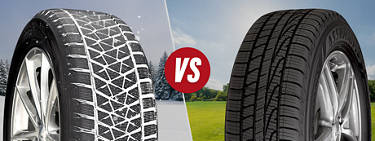Drivers living in winter regions must debate whether to invest in a set of winter tires. But many don’t want to pay for another set of tires, or expect their all-season tires to get them through a winter season.
But there are serious differences between all-season and winter tires!
WHAT ARE ALL-SEASON TIRES?
SHOP ALL-SEASON TIRESAll-season tires are designed for long-lasting comfort, capable handling, and traction for the mildest conditions in each season.
All-season tires are perhaps the most common tire type due to their versatility. They perform well in a wide range of conditions so they are frequently the original equipment (OE) tire pick for new vehicles.
All-season tires have several features that make them appealing for the majority of drivers:
Cost and availability: a wide range of available models and price points
Capability: capable in a wide range of road and weather conditions (suitable for large portions of the United States)
Long-lasting tread: unlike summer or ultra-high performance tires, all-season tires are engineered to last as long as possible (so they can work in all seasons)!
Mileage warranties: typically include at least a modest mileage warranty (40k miles and up)
All-season tires are an excellent option if you face infrequent or mild winter conditions or intend to change to winter tires when the temperature consistently drops below 45F.
Hard fact: all-season tires don’t perform as well as winter tires in winter conditions. All-season tires also cannot brake as well as winter tires in winter conditions, either.
All tire types come with compromises. Unfortunately, there is no perfect tire as one feature will come at the cost of another (like traction for longevity). Summer tires, for example, have superior wet and dry traction to an all-season tire but do not last as long and cannot tolerate cooler temps.
All-weather tires
All-weather tires are capable of handling cooler temps than most all-season tires but cannot replace a dedicated winter tire in average or heavy winter conditions.
All-weather tires are an emerging tire category and are better optimized for cooler weather. Designed for strong performance year-round, they are better able to cope with light winter conditions than a typical all-season tire. They typically sport the three-peak mountain snowflake rating for severe weather use which is not commonly certified for all-season models.
All-weather tires are an excellent year-round option if you live in regions with mild or no winter conditions (a few light flurries and general cool down, for example). The southeast and southwestern United States are excellent places for an all-weather tire.
Check out our picks for the best all-weather tires.
WHAT ARE WINTER TIRES?
SHOP WINTER TIRESWinter tires are highly specialized for safe winter performance. They are designed to confidently function in temps below 45F and feature tread elements to maintain traction in dry, wet, icy, or snowy driving conditions.
Discount Tire strongly recommends that if you live in a region that experiences temperatures consistently at or below 45F to use winter tires for the highest degrees of safety possible.
Although often called “snow tires” they do not only work in snow. Their main purpose is to work in cold temperatures when other tires cannot. They can stay flexible and functional when other tires cannot. This is why we prefer calling them “winter tires”!
Winter tires are constructed to handle cold and winter obstacles using:
Soft rubber with highly specialized tread compounds of heavy silica and/or oil compounds, such as orange or canola oil, to stay flexible
Bite particles to act like microscopic studs for ice traction
Winter-centric tread patterns with heavy siping, water channels, and deep grooves to remove moisture and snow
Winter tires offer confidence and superior driving capability, including cornering and braking, in winter conditions. The average winter tire has hundreds more sipes and more grooves than a typical all-season tire, giving as much as a 50% increase in traction and control.
If you regularly encounter icy roads, studded winter tires might be a good option to consider. Built with rugged metal pins that hold fast onto icy driving surfaces, they offer increased traction. Many tires come with pin holes to add studs.
SHOP STUDDED TIRESYou may need to use tire chains depending on your region, especially in mountainous areas. We compare tire chains to studded tires here.
Learn more at our winter tire info page.
DO I NEED WINTER TIRES?
You may need winter tires if your region experiences:
Consistent temperatures under 45F
Rain
Snow
Ice
Even if your area experiences temps under 45F but no rain, snow, or ice, you should still consider using winter tires for the best performance and level of safety possible. All-season tires cannot perform as well in cold temperatures compared to winter tires.
But if you live in a mild climate or one that doesn’t frequently get significant winter weather or consistently cold temperatures, then an all-season or all-weather tire may be better suited for you.
If you’re not sure what tires are best for you, you can find out on Treadwell, our smart tire buying guide. In a few easy steps, it’ll pair you with the best tires for you, your vehicle, and your zip code!
START WITH TREADWELLReady to roll?
Discount Tire offers winter tire changeover and installation services! Let us handle it.
WINTER TIRE CHANGEOVERDouble up on safety, value, and style with winter wheel and tire packages, too.
Still have questions? Feel free to drop in or give us a ring. We’re always ready to get you taken care of. Wait less time when you buy and book online!
For more information on this and other tire and wheel services, check out our YouTube Channel or reach out to us on X, Facebook and Instagram.
